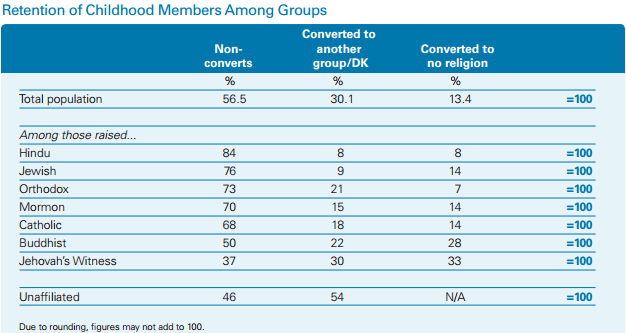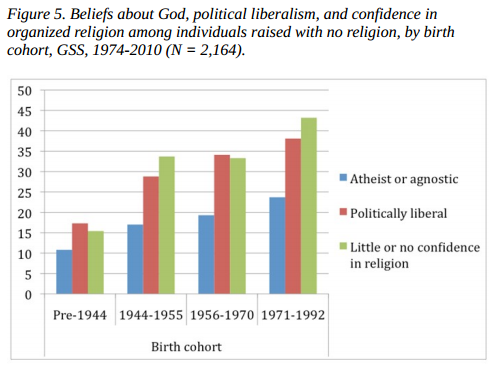People who grow up with no religion have a low “retention rate,” but, apparently, it’s getting better.
In what can be described as a turnabout-is-fair-play move, given the general decline in religious belief in America, several have noted recent studies showing that those who report being brought up without a religion in America usually don’t end up with no religion. There’s a graphic from the Pew Forum showing that only 46% of those saying that they were brought up with no particular religious affiliation still claim no religious affiliation.

It is, for reasons not really clear, even less predictive of atheism for one to say they were “raised atheist.” The 2008 Pew Forum survey had 162 survey responses (weighted at 430 statistically) in the continental U.S. saying that they were “raised atheist.” These survey responses have spawned several articles mentioning the statistics (albeit with little real discussion): most notably from Mark Gray in 2012, most recently from Jesus Creed and Exploring Our Matrix.
Let’s explore that a little.
Here’s the break-down: of the 162 responses that said they were raised as an atheist, 1 came from a pagan, 1 from “liberal faith,” 2 from Unitarian Universalism, 1 from Shinto, 1 from a Hindu, 6 from Buddhists, 1 from a Shia Muslim, 4 from Jews, 2 from Jehovah’s Witnesses, 1 from a Mormon, 2 from Orthodox Christians, 17 from Catholics, 56 from Protestants, 43 from atheists, 6 from agnostics, 13 from “none,” and 5 from “Don’t Know.”
Or, looking at those who say they were “raised atheist” and their answer to whether they believe in God or a universal spirit, 55% say yes, 26% say no, 6% express another opinion, and 13% say that they don’t know.
If you can spin a narrative from that, great. Most commonly suggested is that atheist parents are rather good at making Protestant children in America. Yet all the normal caveats to interpreting statistics apply. I am reluctant to bring them up because I am an atheist myself. I prefer to accept valid empirical data. However, previous (apparently gleeful) reports don’t mention any caveats to interpretation at all, so I guess someone has to do it.
(1) Small sample size (for this subgroup, as the survey itself is one of the largest of its kind)
(2) Possible lack of fit between what people answer and how we understand it
(3) Possible lack of correspondence between self-reporting and actual fact
(Yes, Americans sometimes have a problem with being entirely truthful to the survey takers on religion.)
Who really knows? Claiming to be raised atheist (as opposed to being raised in no particular religion, which accounted for 2,020 responses in the survey, over 12 times as many responses as being raised atheist) is a little unusual in the United States in the first place. Perhaps this group in particular needs to be studied more closely.
Indeed someone has looked at this and related phenomena more closely: Stephen M. Merino in his article Irreligious Socialization? The Adult Religious Preferences of Individuals Raised with No Religion. His article is significant for attempting to break down the phenomenon by age cohort. His study looks at the entire group of people raised with no religion (including as atheist, agnostic, or “none”).
He explains this, in part, by the fact that it is increasingly common for someone with no religious affiliation to find a partner in adulthood who also has no religious affiliation.
However, as they say in finance, “past performance is not a guarantee of future results.” If we want to know what young people today will grow up to believe, only time will tell.
PS – You can download some of the relevant Pew Forum data in an Excel spreadsheet here and the original data here.
PPS – Other, more recent surveys from 2012 put the “retention rate” for the unafilliated at 53% or 61%.
